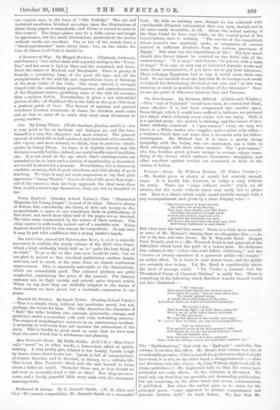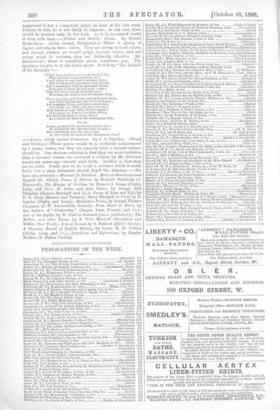POICTRY.—Songs. By William Renton. (T. Fisher Unwin.)— —Mr. Renton gives
us plenty of sound, but scarcely enough sense. It is hardly fair, however, to judge a song without its music. There are "songs without words" which we all admire, but the words without music may easily fail to please one. Here is a stanza which might sound prettily enough with a gay accompaniment, and given by a clear, ringing voice : — " The billows band In hand advance
On either side along the bay, They bow, then onrtsez, ere they dance And dash themselves in foam away.
So bow and curtsey, boys and girl', And foot the fairyland you seek, The breeze blows promise through your curls And brings fulfilment to each cheek."
But what does the last line mean P There is a little more warmth in some of Mr. Renton's singing than we altogether like.—An Ode to the Sun, and other Poems. By R. Warwick Bond. (Kogan Paul, Trench, and Co.)—Mr, Warwick Bond is not ignorant of the difficulties which beset the path of a minor poet. He dedicates this volume to the "critics who read before criticising," and the "twelve or twenty members of a generous public who bought" an earlier effort, It is hard to read minor verse, and the public are certainly slow to buy. Yet Mr. Bond is considerably above the level of average merit. "V Victis ! a Lament over the Threatened Decay of Classical Studies," is really fine. There is something in the following which Matthew Arnold himself would not have disdained :— "Ah I long ago That glory Bank beyond the western stoop: Fast comes the night I but yet some after-glow The lonely uplands keep;
A roseate flush still lingers in the skies, And echoes faint are hoard of vanished harmonies.
We watch it fade, That heavenly light I we hear those voices die I Mutely we sit, with folded hands, betrayed To idle phantasy We hear but discord in the world's new song;
We cannot share its feast, nor join its hurrying throng :
Like an old hound That patient waits in his dead master's hall; And strains his oar for the loved footstep's sound, The old familiar call;
And, brooding o'er a dear face unforgot,
Turns from the strange caress, the hand that comforts not."
The "Epithelamium," that with its " Epilogue " concludes this volume, is another fine effort. Mr. Bond's first volume was one of considerable promise; if this is not all the performance that it might have been, it is not, on the other hand, a disappointraent.—Echo and Narcissus, and other Poems. By John William Aiglewood, LL.B. (Same publishers.)—Mr. Aiglewood tells us that the verses here published are early efforts. So far, criticism is disarmed. We need only say that they are passable, not demanding publication, but not requiring, on the other hand, any severe condemnation, if published. But when the author goes on to claim for the principal poem, "some approach to artistic completeness and genuine creative skill," we must demur. We fear that Mr. Aiglewood is not a competent judge, at least of his own work. Failing in this, he is not likely to improve ; in any case, there would be promise only, in the book. As it is, we cannot credit it even with that. —WiNow and Wattle : Poems. By Robert Richardson. (John Grant, Edinburgh.)—There is plenty of vigour and ring in these verses. They are strong in local colour, and though written, we should judge, currente calamo, and not owing much to revision, they are distinctly effective. Mr. Richardson's Muse is sometimes grave, sometimes gay. The specimen we give is of the latter mood. It is from "The Ballade of the Bachelor ":— " There wore maidens onow and sweet, I Wig, Who had lent a not unwilling ear— You'll think it vain. that I mention this—
Had I whispered a question without fear. And I sometimes wish on midnights drear,
Some one of them all had mad° is sign ; Then I'd not sit lonely at thirty year,
Watching the bead in the champagne wine.
There was blue-eyed Nally, and dark-eyed Chris, And Nolly had 'beauty, and Chris had gear ; And laughing Kitty., and grave sweet Joss, And Kitty was witty, and Joss was dear. How handsome and witty all now appear I
(This 6,-rape of France is a drink divine, But drinlring alone is sorry cheer,)
As I watch the bead in the champagne wine.
ENVOY,
Prince, porpend the moral, my envoy's this— Be warned by this cheerless fate of mine—
Have somebody near the cup to kiss As you watch the bead in the champagne wine."
—Poems, chiefly against Pessimism. By J. S. Fletcher. (Ward and Downey.)—These poems would be a creditable achievement by a young writer, but they are scarcely what a second venture should be. One obvious criticism is that they are more imitative than a maturer writer—we reviewed a volume by Mr. Fletcher nearly ten years ago--should send forth. Another is that they are too trite. Youth sees in its work a newness which it really lacks, but a riper judgment should dispel the delusion.—We have also received :—Morituri Te Salutant : Metrical Monologues and Legends (G. Allen); Poems of Nature, by Herbert Hailstone (J. Heywood) ; The Masque of Civitisa, by Francis S. 'Comp (Digby, Long, and Co.) ; St. Peter, and other Verses, by George Bell Doughty (Horace Marshall and Co.) ; Verses of Love and Life, by P. S. Irroy (Reeves and Turner) ; Stray Thoughts in Verse, by E. Leader (Digby and Long); Meditative Poems, by Joseph Thomas Chapman (J. W. Arrowsmith, Bristol) ; From Reart to Heart, by the Author of " Fraternity " (Kogan Paul, Trench, and Co.) ; Out of the Depths, by W. Dulton Burrard (same publishers) ; The Mother, and other Poems, by S. Weir Mitchell (Houghton and Mifflin, New York) ; A Look Bound, by S. Fulford (Elliot Stock); A Rhyming Record of English History, by Linda B. M. Collins (Digby, Long, and Co.) ; Reflections and Refractions, by Charles Weekes (T. Fisher Unwin).







































 Previous page
Previous page